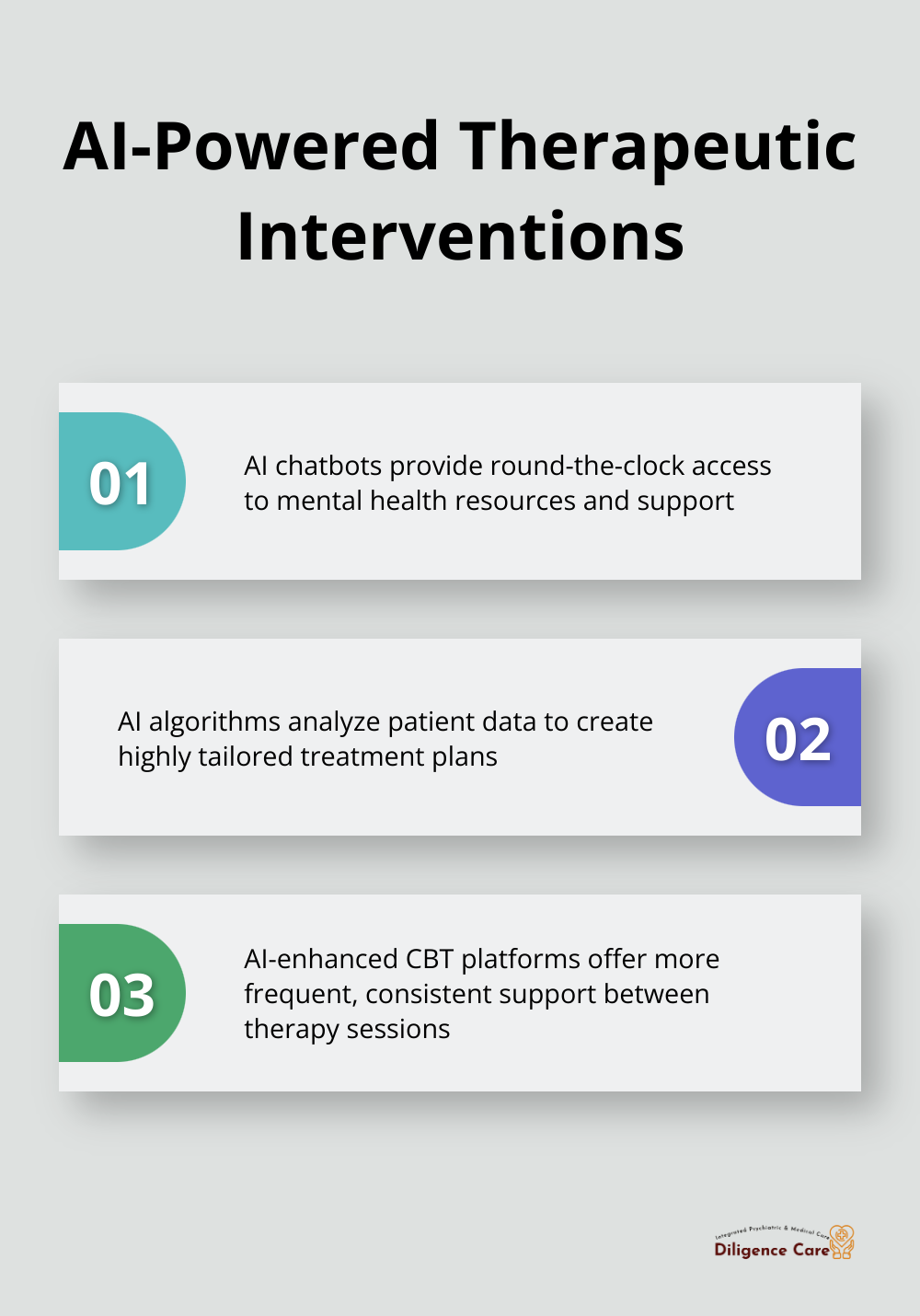
AI in Mental Health: Revolutionizing Care
Artificial intelligence in mental health care is transforming the way we approach diagnosis, treatment, and support for individuals with mental health conditions. At Diligence Integrated Care, we’re witnessing firsthand how AI-powered tools are enhancing our ability to detect disorders earlier and provide more personalized interventions.
These technological advancements are opening up new possibilities for round-the-clock care and data-driven treatment plans. However, as we embrace these innovations, we must also address the ethical considerations and challenges that come with implementing AI in such a sensitive field.
AI Applications in Mental Health Diagnosis
At Diligence Integrated Care, we harness cutting-edge AI technologies to revolutionize mental health diagnosis. These tools amplify our ability to detect and address mental health issues earlier and more accurately, without replacing human expertise.
Machine Learning for Early Detection
Machine learning algorithms transform how we identify mental health disorders in their early stages. These AI systems analyze vast amounts of patient data (including medical histories, genetic information, and lifestyle factors) to spot patterns that might elude even experienced clinicians.
Recent research explores the potential of using behavioral data collected with smartphones to detect and monitor depression symptoms in patients diagnosed with mental health conditions. This approach could lead to earlier interventions and improved patient outcomes.
Natural Language Processing in Speech Analysis
Natural Language Processing (NLP) serves as another powerful AI tool to analyze patient speech patterns. This technology detects subtle changes in language use, tone, and speech rhythm that may indicate the presence of mental health issues.
A recent workshop brought together researchers and practitioners to address the linguistic, cultural, and computational challenges inherent in using NLP for mental health applications. This collaborative effort aims to improve the accuracy and effectiveness of NLP in identifying signs of mental health conditions.
Computer Vision for Facial Expression Analysis
Computer vision AI opens new avenues for understanding patients’ emotional states through facial expression analysis. These systems detect micro-expressions and subtle changes in facial muscles that humans might miss.
A recent study explored the potential of artificial intelligence in analyzing social media data to identify early signs of mental health crises. While not specifically focused on facial analysis, this research demonstrates the broader potential of AI in detecting mental health issues through various data sources.
The integration of these AI applications with clinical expertise enhances our ability to provide accurate, timely diagnoses. This combination of technology and human insight improves mental health outcomes for our patients in San Bernardino, Riverside, and throughout Southern California.

As we move forward, AI-powered therapeutic interventions present the next frontier in mental health care. These innovative tools promise to extend support beyond traditional clinical settings, offering personalized care around the clock.
AI-Powered Therapy: Transforming Mental Health Support
AI-powered therapeutic interventions are reshaping mental health care, offering unprecedented access to support and personalized treatment. This chapter explores how AI chatbots, personalized treatment plans, and AI-enhanced cognitive behavioral therapy are revolutionizing mental health support.
24/7 Support Through AI Chatbots
AI chatbots transform the landscape of mental health support by providing immediate, round-the-clock access to mental health resources. These digital assistants fill crucial gaps in care, offering coping strategies, mindfulness exercises, and mood tracking capabilities that complement traditional therapy.
AI chatbots prove particularly effective for managing mild to moderate symptoms of anxiety and depression. However, it’s important to note that while these tools provide valuable support, they do not replace human therapists. Instead, they serve as an additional layer of care, especially during times when immediate human intervention isn’t available.
Personalized Treatment Plans
AI analysis revolutionizes the creation and adaptation of treatment plans. By processing vast amounts of data (including patient history, symptom patterns, and treatment responses), AI algorithms suggest highly tailored interventions.
Dr. Bolanle Oluwadara, MD, notes that AI-driven personalization significantly improves treatment outcomes for patients with complex mental health conditions. These systems identify subtle patterns that might escape human observation, leading to more precise and effective treatment strategies.
For example, AI analysis might reveal that a patient’s depressive symptoms worsen with certain weather patterns or after specific types of social interactions. This level of insight allows for more targeted interventions and lifestyle recommendations.
AI-Enhanced Cognitive Behavioral Therapy
Cognitive Behavioral Therapy (CBT) remains a cornerstone of mental health treatment, and AI enhances its effectiveness. AI-assisted CBT platforms provide more frequent, consistent support between therapy sessions.
These platforms use natural language processing to analyze patient responses, identify thought patterns, and suggest targeted CBT exercises. This continuous engagement helps reinforce therapeutic concepts and accelerates progress.
AI-enhanced CBT shows promising results, particularly for patients with anxiety disorders. The AI component helps patients practice CBT techniques more consistently, leading to faster symptom improvement.
It’s essential to stress that AI-enhanced CBT is most effective when used in conjunction with human-led therapy sessions. The AI component amplifies the work done with a therapist, rather than replacing it entirely.
The rapid advancement of AI in mental health therapy opens up exciting possibilities for improved access and personalized care. However, it also raises important ethical considerations that must be carefully addressed. The next chapter will explore these challenges and ethical considerations in detail, ensuring responsible implementation of AI in mental health care.

Navigating AI Ethics in Mental Health Care
The integration of AI in mental health care opens unprecedented opportunities for improved diagnosis and treatment. However, it also presents complex ethical challenges that demand careful consideration. This chapter explores the key ethical issues surrounding AI in mental health and proposes strategies to address them.
Protecting Patient Privacy in the Digital Age
Data Privacy and Security stands as a primary concern in AI-driven mental health care. AI systems in mental healthcare often require access to sensitive and personal information, which necessitates robust safeguards to prevent unauthorized access or breaches.
To address these concerns, mental health providers must implement stringent data protection measures. This includes end-to-end encryption, secure cloud storage, and regular security audits. Patients should also receive full information about how their data is used in AI systems. Clear, understandable consent forms are essential. Transparency about data usage increases patient trust and engagement with AI-assisted therapies.
Maintaining the Human Element in AI-Assisted Care
While AI offers powerful tools for mental health care, it’s important to maintain the irreplaceable human element. A recent study revealed that therapists were accurate only 53.9% of the time when assessing the quality of therapy transcripts, no better than chance, and rated human-AI transcripts as higher quality on average.
Dr. Chijioke Iwuchukwu, MD, emphasizes the importance of using AI as a complement to, not a replacement for, human expertise. “AI can process vast amounts of data and identify patterns, but it lacks the nuanced understanding and empathy that human therapists provide,” he notes.

To strike the right balance, mental health providers should:
- Use AI for initial assessments and data analysis
- Have human therapists review AI-generated insights
- Ensure patients have regular face-to-face or video sessions with human therapists
- Train staff to effectively integrate AI tools into their practice
Addressing Bias in AI Mental Health Algorithms
AI algorithms are only as unbiased as the data they’re trained on. Unfortunately, historical biases in mental health research and treatment can perpetuate through AI systems.
To combat this issue, mental health providers must:
- Use diverse, representative datasets to train AI algorithms
- Regularly audit AI systems for bias
- Involve diverse stakeholders in the development and implementation of AI tools
The ethical implementation of AI in mental health care requires vigilance, transparency, and a commitment to continuous improvement. As we navigate these challenges, the potential for AI to enhance mental health care remains immense. The key lies in harnessing this potential responsibly, always keeping the patient’s well-being at the forefront of our efforts.
Final Thoughts
Artificial intelligence in mental health care has revolutionized diagnosis, treatment, and support. AI-powered tools enhance our ability to detect disorders earlier and provide more personalized interventions. These technological advancements have created new possibilities for round-the-clock care and data-driven treatment plans, which significantly improve patient outcomes.
The future of AI in psychiatry looks promising, with anticipated advancements in early detection algorithms and more sophisticated natural language processing for speech analysis. AI-assisted cognitive behavioral therapy will likely become more refined, offering even more targeted interventions. As these technologies evolve, they will continue to complement and enhance the work of human mental health professionals (rather than replace them).
At Diligence Integrated Care, we strive to harness the power of AI to improve mental health outcomes for our patients in San Bernardino, Riverside, and throughout Southern California. We believe in a future where AI and human expertise work in harmony to provide comprehensive, personalized mental health care. Through responsible integration of AI into our practices, we aim to extend the reach of mental health services, making quality care more accessible to those who need it most.











